This post may contain affiliate links.
Whether you’re exploring a National Park or visiting loved ones across the country, RVing is good for you. Science tells us that travel not only helps you feel younger, it also can turn back the clock on aging. Every trip is an opportunity to engage, learn, and be adventurous—all things that can have a positive impact on your health and longevity.
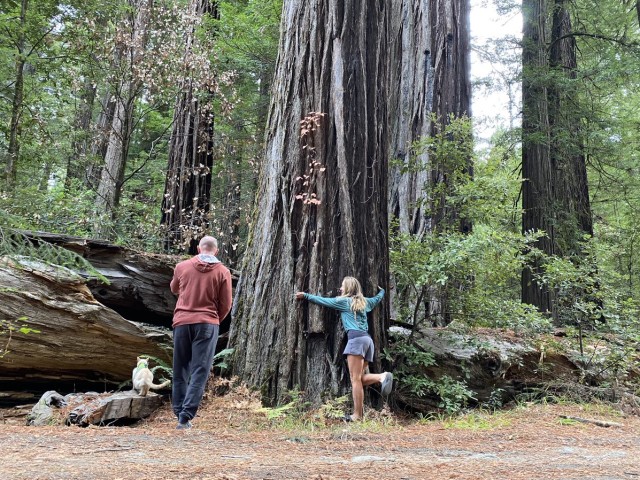
As an RVer myself, none of this surprises me. When James and I are on the road, I just feel different. It’s hard to describe, but the act of traveling changes me. I feel younger, and–this may sound weird–but I even think I LOOK younger when we’re out RVing, too. My outlook morphs to a more youthful and adventurous version of me, less aware of my age or my stresses back home. Each morning I’m eager to jump out of bed, check the new scenery outside the RV window, and start the day’s adventures. I like ‘RVing Stef’ a lot.
But it’s not just about feeling different while RVing, there is more at play than that. RVing actually is good for your health. Here are some ways—backed by research–that travel makes you younger.
1. Travel builds neural pathways.
Did you know that RVing–and any other form of travel–literally changes your brain? When you’re traveling somewhere new, your brain gets to work making sense of all the new stimuli. This triggers the production of new neural pathways—and the more neural pathways you have, the better your brain performs. The personal trainer in me loves this, as I see travel as its own form of exercise. Instead of barbells though, you’re training with new experiences, scenery, people, and destinations. Every RV trip exposes your brain to an environment that’s novel, activating cognitive networks that keep it healthy and sharp. So, RV trips are like a twofer—you get the fun factor PLUS more brain power. Who doesn’t love a good deal like that?!
2. Travel, and RV travel in particular, makes you exceptionally resilient.
Research tells us that resiliency—or the capacity to recover quickly from difficulties—significantly contributes to longevity. People with elevated levels of resiliency not only live longer, they’re also more protected from various mental health issues, such as depression and anxiety. The good news is that the level of resiliency you have now isn’t static. You can nurture and grow it. One of the best ways to build resiliency is to do things outside your comfort zone, like RVing. So much is out of your control when you’re traveling, and every challenge you face on the road makes you a little tougher.
If you’ve ever read through any of the RV-specific Facebook groups, you can easily pick out the resilient RVers from the less-resilient ones based on how they share their challenges. Most of the time, the resilient people are the ones who have been RVing a long time. The sky stopped falling from challenges they’ve had on the road years ago. With experience, you learn to roll with the punches, to problem-solve, and be resourceful. RVing not only makes you exceptionally resilient, but it also gives you a more flexible mindset that carries over to all facets of your life. Challenges happen on the road and off; it is an unavoidable part of life. Question is, how will you react to them?
3. Travel boosts your self-efficacy.
Want to live to 100? Having a healthy dose of confidence and belief in your abilities has been found to be a major distinguishing trait in centenarians. People with high self-efficacy tend to enjoy the challenge of problem-solving and trying new things—it helps keep them young. Hubby James is a perfect example, the most self-efficacious person I’ve ever met. He lives by the little train’s motto, “I think I can I think I can” and has no fear tearing apart our RV to do all sorts of crazy over-the-top mods, like rewiring the entire electrical system, without a plan or net. Self-efficacy doesn’t require anything that extreme, though. The RV lifestyle itself takes it own level of self-efficacy, too. You’re throwing yourself out there, taking a chance on adventures unknown; and that takes confidence! The more trips you take, the more your confidence and your own self-efficacy levels grow.
4. Travel gets you into a healthier headspace so your cortisol levels lower.
Travel is a way to keep you distracted, busy, and connected to something larger. When you don’t have distractions in your life, it’s easy to get focused on yourself and you’re more likely to have trouble with the aging process. RVing helps you take your mind off things causing you stress, and that allows your cortisol levels to lower. Too much cortisol can affect your heart and lower your immune system—neither being friends to longevity. Visiting new places can get you out of your head and give you fresh perspective, so you can tackle life with lowered stress and a healthier mindset.
5. RV trips tend to involve exercise in disguise:
I am a personal trainer after all; I couldn’t leave this one off! Exercise is the most important thing we can be doing to live long and stay healthy. The beauty of RVing is that it gets us moving, and we may not even realize we’re getting exercise! RVing makes us want to explore, and that usually requires a physical effort. Hiking the state park you’re camped at, wandering the tourist town on your driving route, riding your bike to the market… all those things get you coins in your exercise bank, no gym required. Science has consistently established how physical activity plays a significant role in how long—and well—you live. So, even if you don’t exercise regularly, RVing has a way of helping you out with that. But don’t let yourself off the hook completely. Still make sure to get your exercise on top of that!
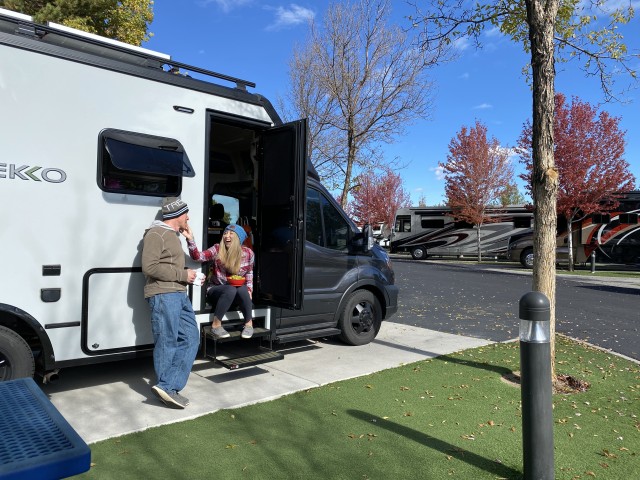
If you’ve been RVing awhile, you can probably relate to these 5 reasons why RVing keeps us young; I know I certainly do. So, consider this your permission slip to add RVing as one of your strategies to improve your health and stay young. Great news, right? Something fun to add to your healthy-living To Do list!



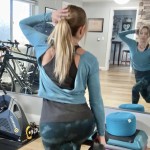
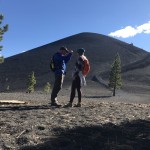
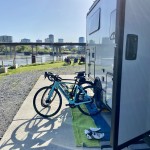
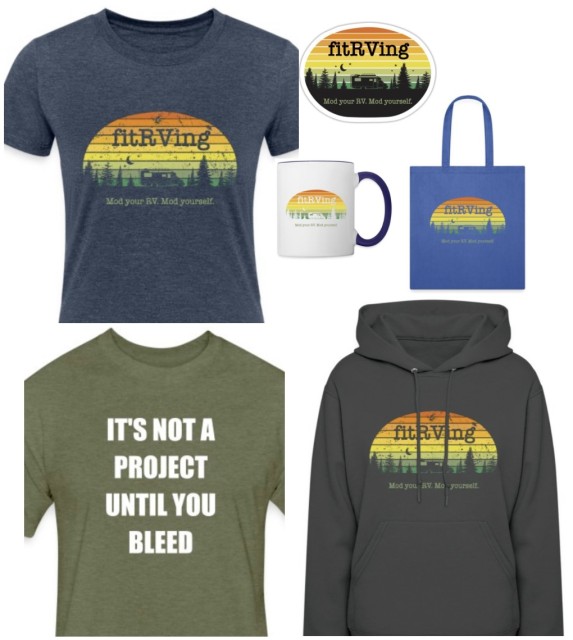




Hello James & Stef, My wife Gina & I are cyclists, and we enjoy all your Utube reviews & mods on your Ekko 22A. We recently retired and are seriously considering the New 2024 “Sprekko” MB Sprinter Chassis. It looks like Winnebago has been listening to many of your great ideas. I think the MB transition is a great idea, but am disappointed that the 4-cylinder diesel engine is used instead of the larger, more powerful 6-cylinder engine. Why? Is there a future option? I’m not sure if you had the opportunity to test-drive the 2024 Spreckko and compare the engine performance to the Ford Transit 3.5L Ecoboost engine. It seems to me like a step forward on the cab amenities & technical improvements, but a step back on engine performance. We would love to hear your thoughts on this.
Hi. First – I don’t think the 6-cylinder diesel is an option on current AWD cab-chassis from Mercedes. At least, it doesn’t seem to be available from the MB Sprinter pages. Winnebago can’t offer it if it isn’t made.
As far as a comparison – you’ll want to stay tuned for our next video. That’s one of the areas we investigate.
What an awesome read! Thanks for sharing Stefany! As you know, we just got back into RVing with the purchase of Skedaddle, but have been getting away every September from our crazy busy summer business for about 12 years. And like you have mentioned, disconnecting from the day to day stuff that you do the rest of the year, those weeks hiking and exploring new areas have revived us.
Great article once again Steph. Totally makes sense. Our brains and vitality can sure thank the RV lifestyle.
Thanks, Shawn! You two are great examples of rockin’ the ‘getting younger’ thing!
Thank you
Me and my wife have been full time RV for 3 years and it has been an amazing experience.
I have referred to this article many times since I have read it.
Here’s hoping your travels continue to challenge you, amaze you, and most of all—keep you young! ❤️
Just want to leave a note of thanks.
I just loved your piece. You are a talented writer who could not have nailed the experience of RVing any better.
Kudos.
So kind; thank you, Steven! RV on! 🙂
Thanks for this great article! It reinforces what I experience with camping. Merry Christmas to you both!
Thanks, Jane; Merry Christmas back at you! And here’s to epic RV adventures in 2023!